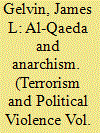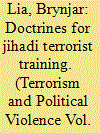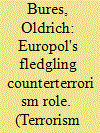|
|
|
Sort Order |
|
|
|
Items / Page
|
|
|
|
|
|
|
| Srl | Item |
| 1 |
ID:
083818


|
|
|
|
|
| Publication |
2008.
|
| Summary/Abstract |
This article situates al-Qaeda and similar jihadi movements within the category of anarchism. In so doing, it challenges the central pillar of the terrorology paradigm: the notion that terrorism is useful as an independent unit of analysis. The article takes a two-fold approach; in the first part, it offers a five-part definition of anarchism, based on the literature in the fields of history, political science, and sociology. Anarchism is distinguished by five characteristics: First, anarchism is an episodic discourse which provides its adherents with a prescription for action and which has been consistently available to, but only sometimes adopted by, political actors in the modern world. Second, anarchism makes for itself the claim of being defensive in nature. Third, anarchism is anti-systemic; i.e., the target of anarchist grievances is the very system (the nation-state system, capitalism) anarchists view as the source of oppression. Fourth, by "othering" the source of oppression, anarchists delineate, either implicitly or explicitly, an ideal counter-community. Finally, unlike the disarticulated domain of, for example, scientific socialism, the discursive field of anarchism draws heavily from the specific cultural milieu from which it springs. The second part of the article examines al-Qaeda and similar movements in terms of these five characteristics, contrasts al-Qaeda with other organizations (Hamas, Hizbullah) which have often been conflated with al-Qaeda under the terrorist rubric, and argues that, based on those characteristics, al-Qaeda does not represent a new or sui generis phenomenon, but rather fits squarely into the anarchist mold.
|
|
|
|
|
|
|
|
|
|
|
|
|
|
|
|
| 2 |
ID:
083819


|
|
|
| 3 |
ID:
083816


|
|
|
|
|
| Publication |
2008.
|
| Summary/Abstract |
Based on an in-depth review of jihadi discourse on terrorist training and preparation, this article finds considerable differences between leading jihadi theorists on issues such as how training should be defined, its ultimate purpose, and where and how to prepare jihadi fighters. However, they all agree on the importance of training, and that ideological indoctrination and spiritual preparation should take precedence over physical and military training. The preparatory process must produce battle-hardened, martyrdom-seeking fighters, whose primary strength lies in their spiritual determination, their patience, and a willingess to employ savagery against the enemy.
|
|
|
|
|
|
|
|
|
|
|
|
|
|
|
|
| 4 |
ID:
083815


|
|
|
|
|
| Publication |
2008.
|
| Summary/Abstract |
This article offers an analysis of Europol's counterterrorism role. Based on official EU documents, internal reports, and secondary sources, it dissects the contemporary counterterrorism activities of both Europol and the informal arrangements outside of the EU structure that are frequently utilized by some EU Member States. Although Europol does not perform any indispensable counterterrorism functions at the moment due to its limited powers and lack of trust from national agencies, the author contends that Europol has the potential to make a substantial contribution to the fight against terrorism.
|
|
|
|
|
|
|
|
|
|
|
|
|
|
|
|
| 5 |
ID:
083811


|
|
|
|
|
| Publication |
2008.
|
| Summary/Abstract |
During the 1990s, Egypt fought a bitter campaign against militant Islamist groups in which over a thousand people died. Since the end of the insurgency in 1997, Egypt's two fiercest Islamic terrorist groups, first the Islamic Group (Al-Gama'a Al-Islamiyya) and then Islamic Jihad, not only ceased their violent activities but also produced and published texts revising their religious beliefs on the use of violence. Based on the counterterrorism experience of Egypt, this paper defines and describes a counterterrorism strategy of ideological reorientation. We define ideological reorientation as a counterterrorism approach that seeks to change core ideological or religious beliefs of the terrorist group, thus bringing the beliefs of group members in line with societal norms. While we cannot causally attribute the groups' decisions to lay down arms to ideological reorientation versus other regime actions (like repression), the Egyptian experience is highly suggestive. First, it indicates that the ideology of religiously-based groups is not exogenous and fixed, as is often assumed, but rather endogenous and flexible. Second, the Egyptian experience suggests that ideological reorientation may be more effective at stemming militancy in the long run compared to rival approaches.
|
|
|
|
|
|
|
|
|
|
|
|
|
|
|
|
| 6 |
ID:
083817


|
|
|
|
|
| Publication |
2008.
|
| Summary/Abstract |
This article aims to describe and analyze the training that foreign jihadis in Iraq have received, how this may impact on the future of the insurgency in Iraq, and the potential spillover effect from the Iraqi jihad scene. The nature of the training in Iraq has been influenced by the difficult conditions the jihadis were operating under, and much has consisted of on-the-job training inside safe houses. The foreign jihadis were dependent on the support of the local Iraqis in order to conduct training, but the increasing use of suicide attacks has turned their erstwhile allies against them
|
|
|
|
|
|
|
|
|
|
|
|
|
|
|
|
| 7 |
ID:
083814


|
|
|
|
|
| Publication |
2008.
|
| Summary/Abstract |
This work addresses the structural weaknesses that threaten to derail counterterrorism efforts by the Malaysian government. It also highlights the links between various pre-September 11 security issues in Southeast Asia and the terrorism threat facing Malaysia at present. The limitations of the current counterterrorism approach by the government are highlighted. In addition, the paper identifies structural problems such as systemic corruption, weaknesses in border security, and inadequate private sector regulation as key areas of concern. The paper concludes by highlighting the symbiotic relationship between a successful counterterrorism campaign and the rule of law.
|
|
|
|
|
|
|
|
|
|
|
|
|
|
|
|
|
|
|
|
|